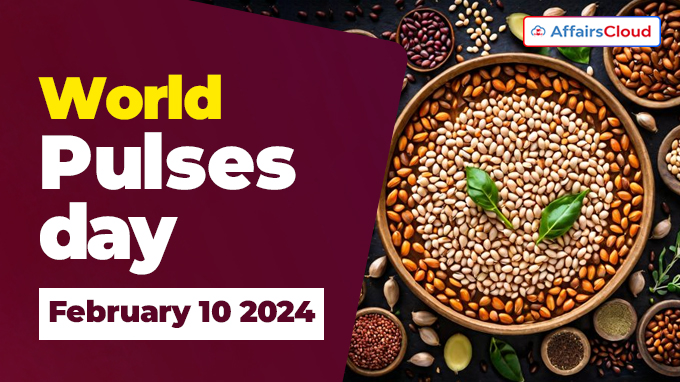 The United Nations (UN) World Pulses Day (WPD) is annually observed across the globe on 10 February to recognise the significance of pulse crops like chickpeas, dry beans, and lentils as a global food.
The United Nations (UN) World Pulses Day (WPD) is annually observed across the globe on 10 February to recognise the significance of pulse crops like chickpeas, dry beans, and lentils as a global food.
The 2024 theme of WPD 2024 is: “Pulses: Nourishing Soils and People.”
- The theme highlights the role of pulses in enhancing soil microbial activity to benefit the people, and the roots of pulses foster the growth of organisms crucial for improving soil structure and nutrient availability.
Objectives:
- Raise awareness of the role of pulses in addressing food security challenges;
- Recognise the contribution of pulses to sustainable food systems and in achieving a healthy and balanced diet.
Significance:
i.WPD highlights the fundamental role of pulses in the transformation to more efficient, inclusive, resilient, and sustainable agrifood entities for better production, nutrition, environment, and life for everyone.
ii.WPD also highlights pulses as a sustainable choice, adding diversity to agricultural production systems and contributing to healthy soils in a changing climate and environment.
Background:
i.The United Nations General Assembly (UNGA) adopted the resolution A/RES/73/251 on 20th December 2018, and proclaimed 10 February of every year as WPD.
- Burkina Faso, a landlocked country in West Africa proposed the observance of WPD.
ii.The day was established following the successful implementation of International Year of Pulses (IYP) in 2016 by FAO.
iii.The 1st ever WPD was observed on 10 February 2019.
International Year of Pulses (IYP):
i.On 20 December 2013, the UNGA adopted a resolution A/RES/68/231 and declared the year 2016 as the International Year of Pulses (IYP).
ii.The FAO was nominated to facilitate the implementation of the IYP 2016 in collaboration with Governments, relevant organizations, non-governmental organizations (NGOs), and all other relevant stakeholders.
What are Pulses?
i.Pulses, also known as legumes, are the edible seeds of leguminous plants cultivated for both food and feed. Pulses are rich in protein, fiber, and several vitamins.
ii.Dried beans, chickpeas, lentils, and peas are the most commonly known and consumed types of pulses.
iii.The word pulse originates directly from the Latin word ‘puls’ meaning “thick gruel, porridge, mush.”
Key Facts:
i.Pulses are highly water efficient for producing 1 kilogram (kg) of lentils needs 1250 liters, while 1 kg of beef requires 13,000 liters.
ii.The nitrogen-fixing properties of pulses can improve soil fertility, which improves and extends the productivity of farmland.
iii.India is set to become the world’s largest producer of lentils (Masur) in the current 2023-24 crop year (July to June), with an estimated surge in production of around 16 lakh tonnes.
About Food and Agriculture Organization of the United Nations (FAO) :
Director-General– Qu Dongyu
Headquarters– Rome, Italy
Founded in 1945




